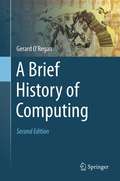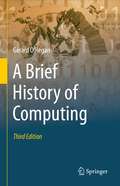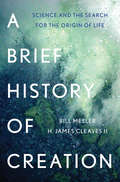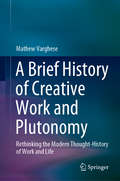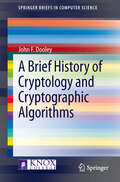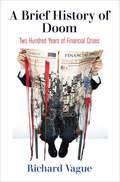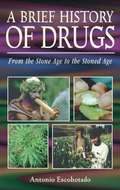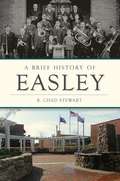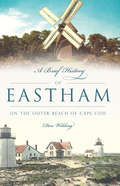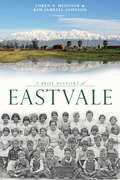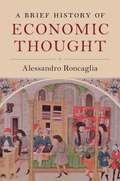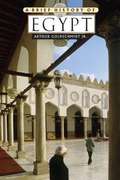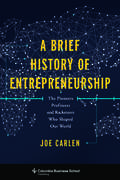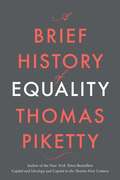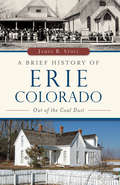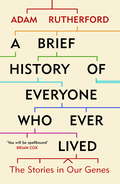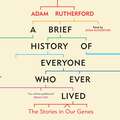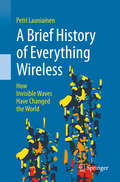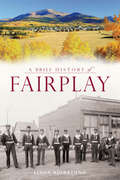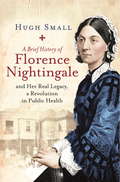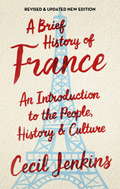- Table View
- List View
A Brief History of Computing
by Gerard O'ReganThis lively and fascinating text traces the key developments in computation - from 3000 B.C. to the present day - in an easy-to-follow and concise manner. Topics and features: ideal for self-study, offering many pedagogical features such as chapter-opening key topics, chapter introductions and summaries, exercises, and a glossary; presents detailed information on major figures in computing, such as Boole, Babbage, Shannon, Turing, Zuse and Von Neumann; reviews the history of software engineering and of programming languages, including syntax and semantics; discusses the progress of artificial intelligence, with extension to such key disciplines as philosophy, psychology, linguistics, neural networks and cybernetics; examines the impact on society of the introduction of the personal computer, the World Wide Web, and the development of mobile phone technology; follows the evolution of a number of major technology companies, including IBM, Microsoft and Apple.
A Brief History of Computing
by Gerard O'ReganThis lively and fascinating text traces the key developments in computation – from 3000 B.C. to the present day – in an easy-to-follow and concise manner. Topics and features: ideal for self-study, offering many pedagogical features such as chapter-opening key topics, chapter introductions and summaries, exercises, and a glossary; presents detailed information on major figures in computing, such as Boole, Babbage, Shannon, Turing, Zuse and Von Neumann; discusses the earliest computers developed in the United States, Germany and Britain; discusses the development of the IBM 360 family of computers and its importance; discusses the invention of the transistor and integrated circuit; discusses the birth of the software industry and the evolution of human-computer interaction; reviews the history of programming languages, operating systems and software engineering; discusses the progress of artificial intelligence; discusses the invention of the microprocessor and the development of home and personal computers; examines the impact on society of the introduction of the personal computer, the World Wide Web, and the development of mobile phone technology; discusses smart phones and social media and the challenge of fake news; reviews a miscellany of innovations in the computing field such as cloud computing, the Internet of Things, and Quantum Computing; discusses legal aspects of computing and the professional responsibilities of computer professionals.
A Brief History of Creation: Science and the Search for the Origin of Life
by Bill Mesler H. James Cleaves IIThe epic story of the scientists through the ages who have sought answers to life’s biggest mystery: How did it begin? In this essential and illuminating history of Western science, Bill Mesler and H. James Cleaves II seek to answer the most crucial question in science: How did life begin? They trace the trials and triumphs of the iconoclastic scientists who have sought to solve the mystery, from Darwin’s theory of evolution to Crick and Watson’s unveiling of DNA. This fascinating exploration not only examines the origin-of-life question, but also interrogates the very nature of scientific discovery and objectivity.
A Brief History of Creative Work and Plutonomy: Rethinking the Modern Thought-History of Work and Life
by Mathew VargheseThis book discusses the influence of creative work on human life, and the role it has played in shaping human civilization since antiquity. To do so, it analyzes the history of thought on creative work from three civilizations: Greek, Indian, and Chinese, as well as contemporary neurological studies on consciousness. According to the classical Greeks, humans are instinctively predisposed to use creative work to gain truth, wisdom and happiness; the Indians consider that Dharma (duty, morality, etc.) can be achieved only through work (karma); and for the Chinese, creative work is needed to attain the supreme wisdom (Dao). Modern studies on consciousness show that our brain creates a personal self-model (ego tunnel) when we learn things creatively, and developing such skills provides lifelong protection for the brain. In the 21st century, human involvement in creative work is declining as we use mechanized systems to gain more and more profit, but the wealth falls into the hands of the few superrich: the Plutonomy. As creative work is taken over by AI systems, human work is reduced to operating those machines, and this in turn leads to an exponential growth in the number of part-time workers (Precariat). The declining value of human life today is a consequence of this change in society. Further, reducing creative work means we have no way to distribute wealth, nor do we have any means to address problems like the lack of enthusiasm in the young; the health crisis due to lack of physical activity; or the environmental crisis due to the high demand for energy to run mechanized systems. This book explores these issues.
A Brief History of Cryptology and Cryptographic Algorithms (SpringerBriefs in Computer Science)
by John F. DooleyThe science of cryptology is made up of two halves. Cryptography is the study of how to create secure systems for communications. Cryptanalysis is the study of how to break those systems. The conflict between these two halves of cryptology is the story of secret writing. For over 2,000 years, the desire to communicate securely and secretly has resulted in the creation of numerous and increasingly complicated systems to protect one's messages. Yet for every system there is a cryptanalyst creating a new technique to break that system. With the advent of computers the cryptographer seems to finally have the upper hand. New mathematically based cryptographic algorithms that use computers for encryption and decryption are so secure that brute-force techniques seem to be the only way to break them - so far. This work traces the history of the conflict between cryptographer and cryptanalyst, explores in some depth the algorithms created to protect messages, and suggests where the field is going in the future.
A Brief History of Dog Guides for the Blind
by Nelson CoonThis small book originally an article written by the reference librarian at the Blindiana Library at Perkins School for the Blind highlights the varied and long history of dog guides for blind people. From Pompae, to Japan, from the 15th centure to biblical times the author depicts and writes about dogs guiding blind people. Illustrated with descriptive paintings and texts from various books, this book is a treasure for anyone who loves dogs, and or history.
A Brief History of Doom: Two Hundred Years of Financial Crises (Haney Foundation Series)
by Richard VagueFinancial crises happen time and again in post-industrial economies—and they are extraordinarily damaging. Building on insights gleaned from many years of work in the banking industry and drawing on a vast trove of data, Richard Vague argues that such crises follow a pattern that makes them both predictable and avoidable.A Brief History of Doom examines a series of major crises over the past 200 years in the United States, Great Britain, Germany, France, Japan, and China—including the Great Depression and the economic meltdown of 2008. Vague demonstrates that the over-accumulation of private debt does a better job than any other variable of explaining and predicting financial crises. In a series of clear and gripping chapters, he shows that in each case the rapid growth of loans produced widespread overcapacity, which then led to the spread of bad loans and bank failures. This cycle, according to Vague, is the essence of financial crises and the script they invariably follow.The story of financial crisis is fundamentally the story of private debt and runaway lending. Convinced that we have it within our power to break the cycle, Vague provides the tools to enable politicians, bankers, and private citizens to recognize and respond to the danger signs before it begins again.
A Brief History of Drugs: From the Stone Age to the Stoned Age
by Antonio EscohotadoThis fascinating book examines the instrumental role drugs have played in our cultural, social, and spiritual development from antiquity to the present.
A Brief History of Easley (Brief History)
by R. Chad StewartEasley has a rare combination of a quaint Main Street and a thriving industrial presence. The city was a series of small farms and open land until residents convinced officials to make the area a stop along the Atlanta and Richmond Air-Line Railroad after the Civil War. Access to the railroad and the popularity of cotton spurred an era of rapid growth and expansion, culminating in the dominance of the textile industry throughout most of the twentieth century. While cotton drove textiles in the area, advances in agriculture and manufacturing brought dozens of companies, placing Easley at the center of the state’s biggest industrial area. Author Chad Stewart details the history of a city that moved from sleepy train stop to vibrant South Carolina city.
A Brief History of Eastham: On the Outer Beach of Cape Cod (Brief History)
by Don WildingFirst known as Nauset, Eastham once reached across the eastern half of Cape Cod from Bass River to the tip of what is now Provincetown. The area was home to the Nauset tribe for thousands of years before exploration by Champlain and the Pilgrims, and it is now known as the “Gateway to the Cape Cod National Seashore.” Whether it’s the U.S. Life-Saving Service and its shipwreck rescues, Cape Cod’s oldest windmill or tales of sea captains and rumrunners, Eastham is truly rich in history and tradition. Author Don Wilding wanders back in time through the Outer Cape’s back roads, sand dunes and solitary beaches to uncover Eastham’s fascinating past.
A Brief History of Eastvale (Brief History)
by Kim Jarrell Johnson Loren P. MeissnerThe vibrant and beloved community of Eastvale was once an agrarian paradise. Developed initially as ranchlands, this area tucked along the Santa Ana River was transformed by industrious farmers who produced alfalfa and other crops, raised poultry and eventually thrived as dairymen. Eastvale's latest agents of change, however, weren't cattlemen or farmers but real estate agents. Indeed, land developers saw the same potential in Eastvale as the initial ranchers did. Beginning in the 1990s, developers created charming homes and planned neighborhoods for former city dwellers eager to live in Riverside County. Despite the changes, the bucolic ambiance of the bygone era remains. Authors Loren P. Meissner and Kim Jarrell Johnson recount the dynamic changes, important people and exciting events that created Eastvale.
A Brief History of Economic Thought
by Alessandro RoncagliaThe evolution of economic thought can be traced back from its beginnings in classical antiquity up to the present day. In this book, Professor Alessandro Roncaglia offers a clear, concise and updated version of his award-winning The Wealth of Ideas, studying the development of economic thought through perspectives and debates on the economy and society over time. With chapters on prominent economic theorists, including William Petty, Karl Marx, and John Maynard Keynes, as well as on other important figures and key debates of each period, Roncaglia critically evaluates the foundations of the marginalist-neoclassical (scarcity-utility) approach in comparison to the Classical-Keynes approach. A comprehensive guide to the history of economic thought, this book will be of value not only to undergraduate and postgraduate students studying economic thought, but also to any readers desiring to study how economics has evolved up to the present day.
A Brief History of Egypt
by Arthur GoldschmidtThis reference for high school and up explores Egypt's broad political, economic, social, and cultural developments, from ancient times to the diverse cultural and political landscape of today. Complementing the narrative are sidebars with information on topics such as gods and goddesses of ancient Egypt, and political parties in the early part of the 20th century. Appendices offer a glossary, a list of basic facts, a chronology, and suggestions for further reading. Annotation ©2008 Book News, Inc., Portland, OR (booknews.com)
A Brief History of Entrepreneurship: The Pioneers, Profiteers, and Racketeers Who Shaped Our World (Columbia Business School Publishing)
by Joe CarlenA Brief History of Entrepreneurship charts how the pursuit of profit by private individuals has been a prime mover in revolutionizing civilization. Entrepreneurs often butt up against processes, technologies, social conventions, and even laws. So they circumvent, innovate, and violate to obtain what they want. This creative destruction has brought about overland and overseas trade, colonization, and a host of revolutionary technologies—from caffeinated beverages to the personal computer—that have transformed society.Consulting rich archival sources, including some that have never before been translated, Carlen maps the course of human history through nine episodes when entrepreneurship reshaped our world. Highlighting the most colorful characters of each era, he discusses Mesopotamian merchants' creation of the urban market economy; Phoenician merchant-sailors intercontinental trade, which came to connect Africa, Asia, and Europe; Chinese tea traders' invention of paper money; the colonization of the Americas; and the current "flattening" of the world's economic playing field. Yet the pursuit of profit hasn't always moved us forward. From slavery to organized crime, Carlen explores how entrepreneurship can sometimes work at the expense of others. He also discusses the new entrepreneurs who, through the nascent space tourism industry, are leading humanity to a multiplanetary future. By exploring all sides of this legacy, Carlen brings much-needed detail to the role of entrepreneurship in revolutionizing civilization.
A Brief History of Equality
by Thomas PikettyThe world’s leading economist of inequality presents a short but sweeping and surprisingly optimistic history of human progress toward equality despite crises, disasters, and backsliding. A perfect introduction to the ideas developed in his monumental earlier books. It’s easy to be pessimistic about inequality. We know it has increased dramatically in many parts of the world over the past two generations. No one has done more to reveal the problem than Thomas Piketty. Now, in this surprising and powerful new work, Piketty reminds us that the grand sweep of history gives us reasons to be optimistic. Over the centuries, he shows, we have been moving toward greater equality. Piketty guides us with elegance and concision through the great movements that have made the modern world for better and worse: the growth of capitalism, revolutions, imperialism, slavery, wars, and the building of the welfare state. It’s a history of violence and social struggle, punctuated by regression and disaster. But through it all, Piketty shows, human societies have moved fitfully toward a more just distribution of income and assets, a reduction of racial and gender inequalities, and greater access to health care, education, and the rights of citizenship. Our rough march forward is political and ideological, an endless fight against injustice. To keep moving, Piketty argues, we need to learn and commit to what works, to institutional, legal, social, fiscal, and educational systems that can make equality a lasting reality. At the same time, we need to resist historical amnesia and the temptations of cultural separatism and intellectual compartmentalization. At stake is the quality of life for billions of people. We know we can do better, Piketty concludes. The past shows us how. The future is up to us.
A Brief History of Erie, Colorado: Out Of The Coal Dust (Brief History)
by James B. StullFrom 1866 until 1979, Erie was one of the largest coal-producing towns in the nation. Numerous settlers contributed to building Old Town and making it one of the liveliest communities in northern Colorado. The Columbine Mine massacre in 1927 incited major changes to coal mining practices, inspiring unionization efforts nationally. The improved rights and working conditions that miners struggled to win benefit employees across America today. Emeritus Professor James B. Stull illuminates Erie's earliest pioneers, houses, schools and churches and the town's enduring evolution.
A Brief History of Everyone Who Ever Lived: The Stories in Our Genes
by Adam Rutherford'A brilliant, authoritative, surprising, captivating introduction to human genetics. You'll be spellbound' Brian CoxThis is a story about you. It is the history of who you are and how you came to be. It is unique to you, as it is to each of the 100 billion modern humans who have ever drawn breath. But it is also our collective story, because in every one of our genomes we each carry the history of our species - births, deaths, disease, war, famine, migration and a lot of sex. In this captivating journey through the expanding landscape of genetics, Adam Rutherford reveals what our genes now tell us about human history, and what history can now tell us about our genes. From Neanderthals to murder, from redheads to race, dead kings to plague, evolution to epigenetics, this is a demystifying and illuminating new portrait of who we are and how we came to be.***'A thoroughly entertaining history of Homo sapiens and its DNA in a manner that displays popular science writing at its best' Observer 'Magisterial, informative and delightful' Peter Frankopan'An extraordinary adventure...From the Neanderthals to the Vikings, from the Queen of Sheba to Richard III, Rutherford goes in search of our ancestors, tracing the genetic clues deep into the past' Alice Roberts
A Brief History of Everyone Who Ever Lived: The Stories in Our Genes
by Adam Rutherford'A brilliant, authoritative, surprising, captivating introduction to human genetics. You'll be spellbound' Brian CoxThis is a story about you. It is the history of who you are and how you came to be. It is unique to you, as it is to each of the 100 billion modern humans who have ever drawn breath. But it is also our collective story, because in every one of our genomes we each carry the history of our species - births, deaths, disease, war, famine, migration and a lot of sex. In this captivating journey through the expanding landscape of genetics, Adam Rutherford reveals what our genes now tell us about human history, and what history can now tell us about our genes. From Neanderthals to murder, from redheads to race, dead kings to plague, evolution to epigenetics, this is a demystifying and illuminating new portrait of who we are and how we came to be.***'A thoroughly entertaining history of Homo sapiens and its DNA in a manner that displays popular science writing at its best' Observer 'Magisterial, informative and delightful' Peter Frankopan'An extraordinary adventure...From the Neanderthals to the Vikings, from the Queen of Sheba to Richard III, Rutherford goes in search of our ancestors, tracing the genetic clues deep into the past' Alice Roberts
A Brief History of Everything Wireless: How Invisible Waves Have Changed the World
by Petri LauniainenSince the discovery of electromagnetic waves less than 150 years ago, the application of wireless communications technology has not only revolutionized our daily lives, but also fundamentally changed the course of world history.A Brief History of Everything Wireless charts the fascinating story of wireless communications. The book leads the reader on an intriguing journey of personal triumphs and stinging defeats, relating the prominent events, individuals and companies involved in each progressive leap in technology, with a particular focus on the phenomenal impact of each new invention on society. Beginning at the early days of spark-gap transmitters, this tale touches on the emergence of radio and television broadcasting, as well as radio navigation and radar, before moving on to the rise of satellite, near-field and light-based communications. Finally, the development of wireless home networks and the explosive growth of modern cellular technologies are revealed, complete with a captivating account of their corresponding company histories and behind-the-scenes battles over standards.For those wishing to peek behind the magic curtain of friendly user interfaces and clever engineering, and delve further into various processes underlying the ubiquitous technology we depend upon yet take for granted, the book also contains special “TechTalk” chapters that explain the theoretical basics in an intuitive way.
A Brief History of Fairplay (Brief History)
by Linda BjorklundExplore Fairplay from the beginning with local historian Linda Bjorklund as she traces the town's story through Spanish settlers, early American government, Union-Confederate tensions and modern development. Even though Fairplay's remarkable gold and silver boom was reduced to ash overnight in 1873, a strong community overcame history's challenges and preserved its treasures. From the popular annual Burro Days to the Way of Life Museum, Fairplay gives folks a chance to celebrate and relive its rich mining history through festivities and time-capsule buildings such as the general store, drugstore, bank, Summer Brewery and Summer Saloon.
A Brief History of Fascist Lies
by Federico FinchelsteinIn this short companion to his book From Fascism to Populism in History, world-renowned historian Federico Finchelstein explains why fascists regarded simple and often hateful lies as truth, and why so many of their followers believed the falsehoods. Throughout the history of the twentieth century, many supporters of fascist ideologies regarded political lies as truth incarnated in their leader. From Hitler to Mussolini, fascist leaders capitalized on lies as the base of their power and popular sovereignty.This history continues in the present, when lies again seem to increasingly replace empirical truth. Now that actual news is presented as "fake news" and false news becomes government policy, A Brief History of Fascist Lies urges us to remember that the current talk of "post-truth" has a long political and intellectual lineage that we cannot ignore.
A Brief History of Fascist Lies
by Federico Finchelstein"There is no better book on fascism's complex and vexed relationship with truth."—Jason Stanley, author of How Fascism Works: The Politics of Us and Them In this short companion to his book From Fascism to Populism in History, world-renowned historian Federico Finchelstein explains why fascists regarded simple and often hateful lies as truth, and why so many of their followers believed the falsehoods. Throughout the history of the twentieth century, many supporters of fascist ideologies regarded political lies as truth incarnated in their leader. From Hitler to Mussolini, fascist leaders capitalized on lies as the base of their power and popular sovereignty. This history continues in the present, when lies again seem to increasingly replace empirical truth. Now that actual news is presented as "fake news" and false news becomes government policy, A Brief History of Fascist Lies urges us to remember that the current talk of "post-truth" has a long political and intellectual lineage that we cannot ignore.
A Brief History of Florence Nightingale: and Her Real Legacy, a Revolution in Public Health
by Hugh SmallFlorence Nightingale (1820-1910) is best known as a reformer of hospital nursing during and after the Crimean War, but many feel that her nursing reputation has been overstated. A Brief History of Florence Nightingale tells the story of the sanitary disaster in her wartime hospital and why the government covered it up against her wishes. After the war she worked to put the lessons of the tragedy to good use to reduce the very high mortality from epidemic disease in the civilian population at home. She did this by persuading Parliament in 1872 to pass laws which required landlords to improve sanitation in working-class homes, and to give local authorities rather than central government the power to enforce the laws. Life expectancy increased dramatically as a result, and it was this peacetime civilian public health reform rather than her wartime hospital nursing record that established Nightingale's reputation in her lifetime. After her death the wartime image became popular again as a means of recruiting hospital nurses and her other achievements were almost forgotten. Today, with nursing's new emphasis on 'primary' care and prevention outside hospitals, Nightingale's focus on public health achievements makes her an increasingly relevant figure.
A Brief History of Florence Nightingale: and Her Real Legacy, a Revolution in Public Health (Brief Histories)
by Mr Hugh SmallPraise for Small's earlier work on Nightingale: 'Hugh Small, in a masterly piece of historical detective work, convincingly demonstrates what all previous historians and biographers have missed . . . This is a compelling psychological portrait of a very eminent (and complex) Victorian.' James Le Fanu, Daily TelegraphFlorence Nightingale (1820-1910) is best known as a reformer of hospital nursing during and after the Crimean War, but many feel that her nursing reputation has been overstated. A Brief History of Florence Nightingale tells the story of the sanitary disaster in her wartime hospital and why the government covered it up against her wishes. After the war she worked to put the lessons of the tragedy to good use to reduce the very high mortality from epidemic disease in the civilian population at home. She did this by persuading Parliament in 1872 to pass laws which required landlords to improve sanitation in working-class homes, and to give local authorities rather than central government the power to enforce the laws. Life expectancy increased dramatically as a result, and it was this peacetime civilian public health reform rather than her wartime hospital nursing record that established Nightingale's reputation in her lifetime. After her death the wartime image became popular again as a means of recruiting hospital nurses and her other achievements were almost forgotten. Today, with nursing's new emphasis on 'primary' care and prevention outside hospitals, Nightingale's focus on public health achievements makes her an increasingly relevant figure.
A Brief History of France, Revised and Updated (Brief Histories)
by Cecil JenkinsWhen we think of France, we tend think of fine food and wine, the elegant boulevards of Paris or the chic beaches of St Tropez. Yet, as the largest country in Europe, France is home to extraordinary diversity. The idea of 'Frenchness' emerged through 2,000 years of history and it is this riveting story, from the Roman conquest of Gaul to the present day, that Cecil Jenkins tells: of the forging of this great nation through its significant people and events and and its fascinating culture. As he unfolds this narrative, Jenkins shows why the French began to see themselves as so different from the rest of Europe, but also why, today, the French face the same problems with regard to identity as so many other European nations.
